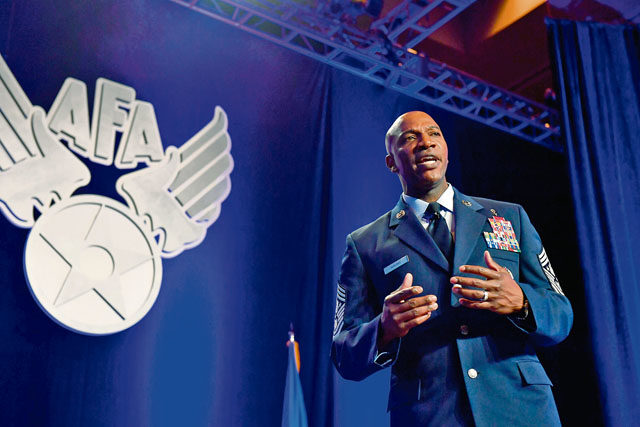
Chief Master Sgt. of the Air Force Kaleth O. Wright speaks about leading Airmen at the Air Force Association Air Warfare Symposium March 2 in Orlando, Florida.
ORLANDO, Florida — Chief Master Sgt. of the Air Force Kaleth O. Wright addressed the areas in which he looks to focus on during his tenure as the 18th chief master sergeant of the Air Force at the Air Force Association Air Warfare Symposium March 2 in Orlando.
As an adviser to the secretary and chief of staff of the Air Force on behalf of nearly 399,000 total force enlisted Airmen, Wright said he more importantly wants to be “an advocate, a voice, a champion for each and every one of those Airmen and their families.”
In order to be effective in helping each Airman in every specialty be successful and accomplish the Air Force mission Wright said, “I think the most significant thing that I can do for all of our commanders (and) for all of our Airmen is to make sure that our Airmen are well trained, well led and resilient.”
Well trained
Wright insisted training must be the foundation for Airmen. Using his experience as an athlete growing up, Wright said players don’t become a champion by just stepping onto the field, but evolve through focused and deliberate training.
According to Wright, enlisted Airmen make up nearly 85 to 90 percent of squadrons. He said in order to supplement Air Force Chief of Staff Gen. David L. Goldfein’s initiative of revitalizing squadrons, it’s imperative that those Airmen are well equipped with the knowledge and skills they need to get the job done.
As the former U.S. Air Forces in Europe and Air Forces Africa command chief, Wright has been out on the field as Airmen honed their “shoot, move, communicate” skills. He’s also been on the flightline and has watched Airmen perform hot pit refuels. He said this type of constant training all across the Air Force definitely makes a difference.
Well led
Having well-equipped Airmen is only half the battle, they also need to be well led.
“Leadership for me centers on helping us become better at managing our talent,” Wright said.
Mainly, he asked, how does the Air Force get the right Airmen with the right skill set and experience into the right roles at the right time and most importantly, with the right attitude?
“When I talk about attitude, I once heard that ‘Talent is interesting but character is everything,’” Wright said.
Wright said he looks forward to working with career field managers to get this right. With a majority of career fields using the vectoring process, he said the Air Force Personnel Center needs to be intertwined as much as possible to ensure Airmen get where they need to be.
Resilient
Wright said it’s very difficult to be an Airman in today’s Air Force. Airmen have faced resource and manning constraints all while balancing a high operations tempo. This has put a major strain on themselves and their families.
With the level of unpredictability and instability, and the challenges the United States faces with violent extremist organizations, Wright said Airmen will have to continue to overcome challenges and obstacles.
The response from Airmen the chief hopes to receive is one of owning those tough circumstances and putting themselves in a position where they’re ready mentally, physically and spiritually, and able to form the support networks necessary to be successful. As the Air Force moves forward, Wright said Airmen and their families need to be resilient.
“We have tons of programs already in place, so I don’t need to build anything. I don’t need to come up with any new great bounding ideas,” Wright said. “All I want to do is to make sure that we integrate the programs we already have and that we present them in a way that Airmen feel comfortable utilizing them.”
When it comes to ensuring the morale within squadrons remains positive while dealing with challenging circumstances, Wright said it falls on leaders in the squadron.
“This is where us, as leaders, have to put to use all the skills that we learned in our development and training and (professional military education),” Wright said. “We have to motivate, encourage, inspire. We have to solve problems at the highest level; we are responsible for creating an environment for our Airmen to thrive.”
Wright said moving forward, if Airmen are well trained, well led and resilient, then the Air Force will continue to possess the strategic advantage that it has today.


